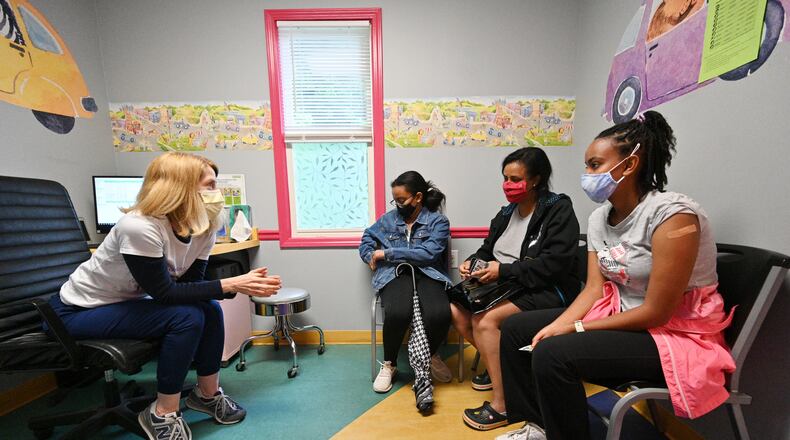In a few swaths of Georgia, particularly in metro Atlanta, parents rushed to get their 12- to 15-year-olds the first dose of the COVID-19 vaccine in the days immediately after it was authorized. But that’s not the case in much of the state.
Overall, families appear to have little or no interest in vaccinating this younger age group, at least at the start of a mass effort to inoculate them. In some Georgia counties, only one child in this age group has been vaccinated, and 52 counties have administered five or fewer vaccines, according to the most recent state Department of Public Health figures obtained by The Atlanta Journal-Constitution.
So far, about 5% of the population group, a total of 26,874 Georgia children, have received a shot over the past 10 days. The figures are based on information uploaded to GRITS, an Internet-based immunization registry for the state.
The most shots were administered in Fulton County, with 5,348 kids ages 12-to-15 getting vaccinated as of Thursday, followed by 4,113 in DeKalb County and 3,021 in Cobb County, according to the data. (The counties where shots were administered were not identified for close to 4,000 doses.)
But many parents remain wary of vaccinating their children, and a lack of demand could prove to be a major obstacle in widespread vaccination and efforts to reach herd immunity.
Credit: HYOSUB SHIN / AJC
Credit: HYOSUB SHIN / AJC
Pediatricians, who are trusted sources for families, are gearing up to play a critical role in helping parents understand the importance of the COVID-19 vaccine and assuring parents the vaccine is safe and effective.
“This is bread and butter pediatrics,” said Dr. Samira Brown, with Piedmont Physicians Pediatrics of Covington. “This is what we do. We vaccinate to prevent disease and know that it saves lives. We are used to having conversations about vaccines. We do this every day. We have been waiting for this moment, and we feel like, yes, finally we have something to offer.”
First, though, pediatricians will have to overcome a logistical challenge: Typically, they don’t have the special ultra-low temperature freezers required for long-term storage of the Pfizer-BioNTech vaccine, the only COVID-19 vaccine currently authorized for children under 16.
Efforts are underway in Georgia to help make it easier for pediatricians to administer the vaccine, and the Food and Drug Administration announced Wednesday the Pfizer-BioNTech’s COVID-19 vaccine could be stored in a refrigerator for a longer period of time, a move that gives those administering vaccines more flexibility, and more time, in managing their doses.
Respecting parents’ decisions
Dr. Hugo Scornik, a Conyers pediatrician and president of Georgia’s chapter of the American Academy of Pediatrics, said vaccinating this younger age group marks a major milestone for teenagers whose lives were upended by a year of online school, social isolation, and a hard stop on many of their favorite activities, such as playing sports.
“We know our families,” Scornik said. “We are well-positioned to have these conversations. I am very excited to have this opportunity to offer this to our patients. This will be helpful so children can to school and not worry about being sick with the virus, and they can play sports and not worry about being sick with the virus.”
But pediatricians are well-aware parents may feel conflicted about the vaccine — even those who got vaccinated themselves.
Parents deciding whether to vaccinate children must weigh several factors at a time when coronavirus infections have declined to their lowest levels in a year. While children who catch the coronavirus tend to have milder symptoms than adults, they can, in rare instances, have severe complications. Children can also get sick and spread the disease, so vaccinating young people can break the chain of infection. People 17 and under in Georgia make up 11% of confirmed cases, 2% of hospitalizations and 0.05% of confirmed COVID-19 deaths, according to an analysis of state data.
The FDA said it determined that the benefits of the vaccine for those 12 years of age and older outweigh the known and potential risks. Available vaccines have worked remarkably well so far for those 16 and up, not only at preventing infection but also at preventing serious illness and hospitalization, even as new variants circulate around the globe.
The FDA said the most commonly reported side effects in the adolescent clinical trial participants were pain at the injection site, tiredness, headache, chills, muscle pain, fever and joint pain, which typically lasted one to three days.
“This is bread and butter pediatrics. ... We are used to having conversations about vaccines. We do this every day. We have been waiting for this moment, and we feel like, yes, finally we have something to offer."
Still, pediatricians interviewed for this story say it’s understandable why parents might have pause with their children. It will be important, they say, for pediatricians and others to listen and respect decisions to hold off any immediate vaccinating.
Hesitancy “is a fair reaction,” said Dr. Stephen Thacker, director of pediatric infectious diseases at Savannah’s Memorial Health University Medical Center.
He said he has been surprised by the number of health care providers who have gotten vaccinated themselves but are holding off getting their children vaccinated. Parents, he said, may be more willing to pursue something with a possible risk of a bad outcome (even though, he said, the risk is extremely low and the data doesn’t suggest any increased risk for children) but want to wait and see for their children.
“I don’t discount that reaction,” he said. “We all love our kids, and many of us love our kids more than ourselves. I would call this a momentary pause, and I would say this is where pediatricians can be amazing and have an opportunity to talk to both parents and children at the same time.”
Thacker said that on the flip side, he knows children who are eager to get vaccinated and are working to get their parents on board.
Brown said her families fall into three categories and almost evenly — the hardcore no, the wait-and-see group, and the eager, ASAP-vaccinate my child. Brown said she believes it’s critical for her to provide information and make time to answer family questions but to not force the issue.
“You need to respect people and where they are on the decision tree,” said Brown. “But for me to tell them they are wrong to be hesitant is wrong. They are right to be hesitant, this is the health of their child and you have to be respectful of that.”
So Brown provides a slip of paper with basic information about the vaccine, makes herself available to answer questions, and recommends sources for more information including the CDC and her favorite: Children’s Hospital of Philadelphia’s Vaccine Education Center.
“Whatever they decide I want them to feel good about the conversation, and I want them to feel that if they decide to not vaccinate at this time they can always come back to me for another conversation,” Brown said.
Doses more widely available
Brown’s practice doesn’t currently administer the vaccine onsite but instead sets up appointments at two Piedmont Healthcare clinics set up to vaccinate eligible children.
Some pediatricians are collaborating with state health officials to address the issue of the ultra-cold storage needed for the Pfizer-BioNTech vaccine. The standard distribution trays hold 1,170 doses, putting enormous pressure on doctors to get shots in arms quickly or risk wasting vaccines if they lack the special freezers.
DPH has recently started splitting up trays into 60 and 120 dose orders and is distributing them among practices.
“I don't discount [vaccine hesitancy]. We all love our kids, and many of us love our kids more than ourselves. ... I would say this is where pediatricians can be amazing and have an opportunity to talk to both parents and children at the same time."
DPH spokeswoman Nancy Nydam said 85 pediatric providers have indicated they want to participate in the program. A list of those providers was not available, but Nydam said most who have signed up are in metro Atlanta, with others in the coastal area of the state, some around Augusta, “and a few more scattered around the state.”
Scornik said his practice is expecting its first shipment from the DPH program soon, and he plans to hold a Saturday vaccination clinic on June 5 for newly eligible 12-to-15-year olds.
Wednesday’s announcement by the FDA about storage requirements for the vaccine also should help overcome the logistical issue. The agency said doses can be stored in the refrigerator for up to 30 days. Previously, the limit was five days.
The vaccine is also available to those under 16 at other locations around the state, including pharmacies, grocery stores and mass vaccination sites, such as the one at Mercedes-Benz stadium. And according to the Biden administration, if teens are on the move this summer, they will be able to get the first dose in one place and the second somewhere else.
Kerri Monfalcone, who works at a medical facility and was vaccinated in January, didn’t hesitate in setting up a vaccination appointment for her 12-year-old son. He was equally eager and got the first dose at a CVS pharmacy five minutes from their Atlanta home.
“He was really excited about the possibility of things turning to normal,” said Monfalcone.
That includes sleepovers and going to a public pool, even a trampoline park. He also can’t wait, she said, to ditch wearing a mask.
“I am hoping that those of us in the first wave who feel comfortable about the safety and effectiveness of the vaccine, that if we go first maybe parents around us who are more hesitant, maybe after a little bit, that will give them less pause.”
Keep Reading
The Latest
Featured







